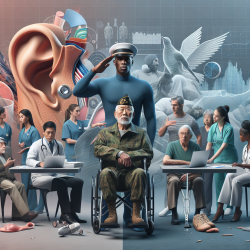Introduction
In the realm of speech-language pathology, the integration of interprofessional trainees into complex care programs has shown promising results, particularly in settings dealing with vulnerable populations such as veterans experiencing homelessness. The study titled "Integrating Interprofessional Trainees into a Complex Care Program for Veterans Experiencing Homelessness: Effects on Health Services Utilization" provides valuable insights into how such integration impacts health services utilization.
Understanding the Research
The research conducted by Gelberg et al. (2021) aimed to assess the effects of incorporating trainees from five different health professions into an interprofessional ambulatory clinic for veterans experiencing homelessness. The study utilized a clinic-level interrupted time series analysis to compare health services utilization before and after the integration of trainees, against three similar clinics without such training programs.
Key Findings
- No significant difference in primary care visits, emergency department visits, mental health visits, or psychiatric hospitalizations between intervention and comparison groups.
- A clinically insignificant change in medical hospitalizations was observed.
- The integration of trainees did not adversely impact inpatient and outpatient care utilization.
These findings suggest that the addition of interprofessional trainees can enhance the educational experience without negatively affecting patient care outcomes.
Implications for Speech-Language Pathology
For practitioners in speech-language pathology, these findings underscore the importance of interprofessional collaboration. By integrating trainees from diverse health professions, practitioners can enhance their skills in addressing complex needs, which is crucial for improving outcomes in pediatric care settings.
Speech-language pathologists can benefit from adopting a team-based care approach, similar to the interprofessional academic homeless patient-aligned care team (IA-HPACT) model used in the study. This model emphasizes:
- Team-based care and collaboration.
- Humanism and relationship-centered communication.
- Quality improvement and social determinants of health.
Encouraging Further Research
The study opens avenues for further research in the field of speech-language pathology. Practitioners are encouraged to explore how integrating interprofessional trainees can impact care delivery in their specific settings. This could involve examining how such integration affects therapy outcomes, patient satisfaction, and overall service utilization.
Conclusion
The integration of interprofessional trainees into care programs for vulnerable populations has demonstrated potential benefits without adverse effects on health services utilization. Speech-language pathologists should consider adopting similar models to enhance care delivery and improve outcomes for children.
To read the original research paper, please follow this link: Integrating Interprofessional Trainees into a Complex Care Program for Veterans Experiencing Homelessness: Effects on Health Services Utilization.










